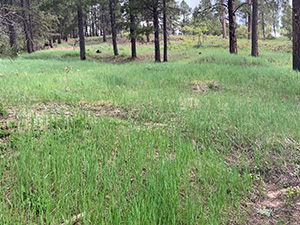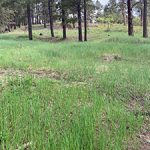
Wildlife Technician II
Opening date: Feb. 6, 2024
Closing date: March 3, 2024
Salary: $16.67 per hour (starting wage)
Location: DWR Great Basin Research Center and Seed Warehouse, 494 W. 100 South, Ephraim, UT 84627 (with multi-day trips throughout Utah)
Time frame: May 13 – Aug. 22, 2024 (~3 months; beginning and end dates may be flexible depending on school schedule or applicant availability)
Positions available: 9
Housing: Not provided; however, a tent and/or trailer will be provided for camping during the work week
The Utah Division of Wildlife Resources, in cooperation with the Bureau of Land Management and U.S. Forest Service, monitors key big game habitat throughout Utah. Repeat long-term range trend studies are used to evaluate vegetation conditions and trends of big game habitat. The primary responsibility of this position is to monitor changes in plant communities using various vegetation sampling methods.
The first half of the summer will focus primarily on monitoring these range trend studies in Southeastern Utah. These areas include the following mountain ranges: Manti-La Sal, La Sal, Henry, Abajo, and Elk Ridge. The last half of the summer will focus on monitoring habitat improvement projects as part of the Watershed Restoration Initiative (WRI), such as chaining, bullhog, harrow, lop and scatter seedings, and other restoration projects. Because these improvement projects occur throughout Utah, applicants can expect to be in various parts of the state each week. For more information about the range trend project, visit our website or Google “Utah Range Trend.”
Working periods consist of four consecutive days in the field, with weekends off. A typical workweek consists of 40–50 hours Monday through Thursday. Typical working hours are from 7 a.m. to 5:30–7:30 p.m. Overtime will be paid at time and a half for time worked over the 40-hour workweek. No paid leave for federal and state holidays. For most of the summer, worksites will be away from the home office in Ephraim and the crew will camp during the week in camp trailers. There may be the possibility of weeks spent camping in tents at various locations in the state, depending upon the work schedule. Per diem will be issued while camping out in the field, as per division policy.
Job duties
The primary responsibility in this position is to monitor changes in plant communities using various vegetation sampling methods.
Job requirements and skills
Must be 18 to apply. Must have the ability to work under extreme conditions and/or inclement weather. Work requires physical exertion. May require the ability to stand, walk over rough surfaces, bend, crouch, stoop, stretch, reach and lift moderately heavy items (up to 50 lbs.) in a recurring manner and/or for long periods of time. Must have the ability to pay close attention to details and listen to instructions, be tolerant of repetitive work and work as a team member.
Preference will be given to applicants with knowledge of plant identification, plant and range ecology, vegetation monitoring, basic computer skills, and 4×4 vehicles.
Other
Individuals working on the project will gain plant identification skills and knowledge of big game habitat. This is a great opportunity for those seeking a career in natural resources to gain needed experience and a working knowledge of Utah’s big game habitat.
Applications
Send a resume (please include previous work experience and list of references), a copy of college transcripts (unofficial), and a list of current coursework to:
Jason Cox
jasoncox@utah.gov
Please contact Jason Cox for further information at 435-201-7270 or jasoncox@utah.gov.
DNR complies with the ADA. Hearing-impaired employees who wish further information regarding this announcement may call the DNR TTY number at 801-538-7458. Disabled employees who desire reasonable accommodation in the interview process should contact the DNR Human Resources Office at 385-315-2834.
People and culture expectation
The successful applicant(s) will be expected to uphold the Division’s values of integrity, professionalism, accountability, teamwork and cooperation. The behaviors they embrace should set an example of professional and personal respect. Seasonal employees are expected to actively promote a workplace free of discrimination and harassment, as well as make good faith efforts to understand people as unique individuals with diverse life experiences, challenges and opportunities.